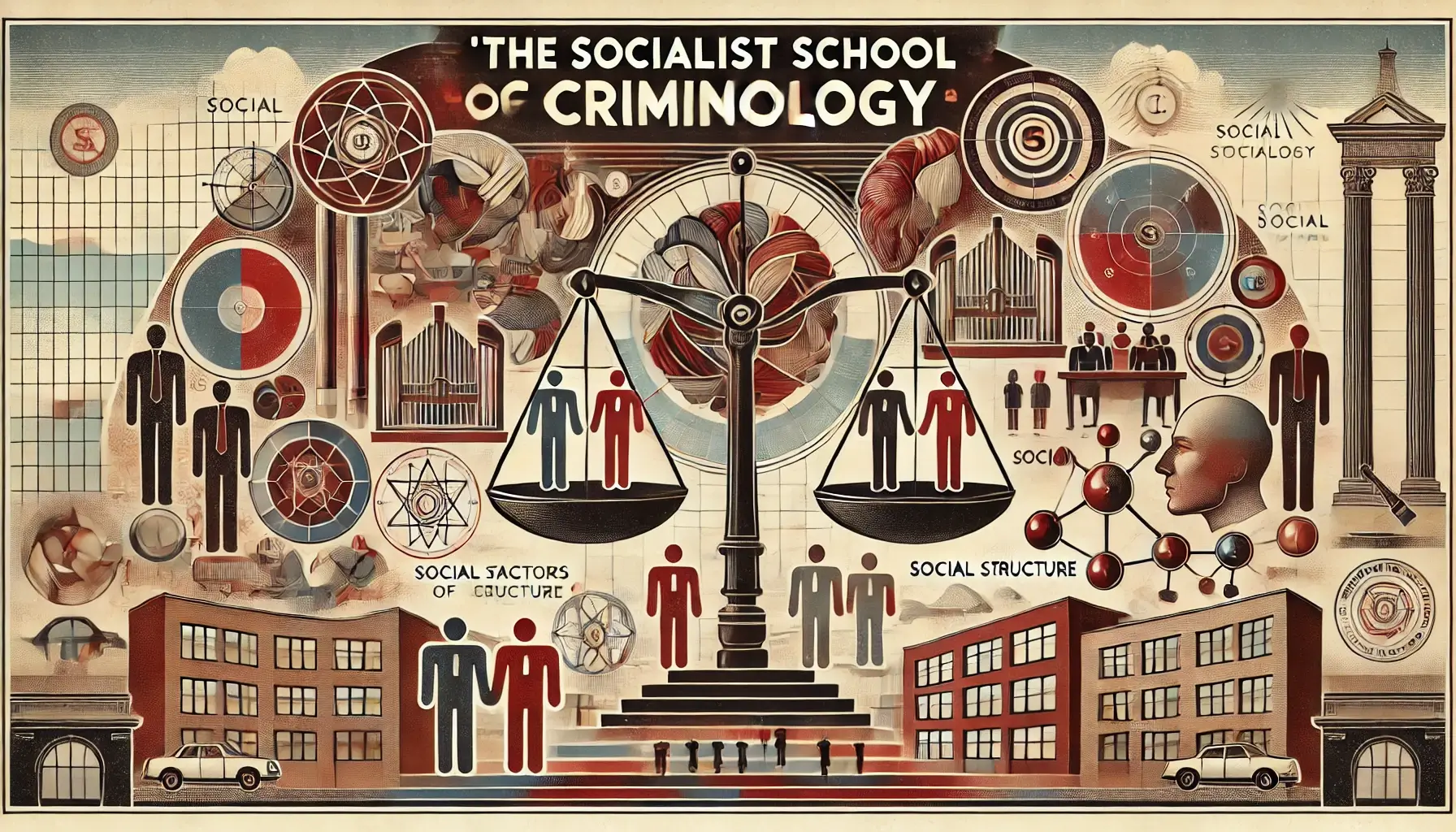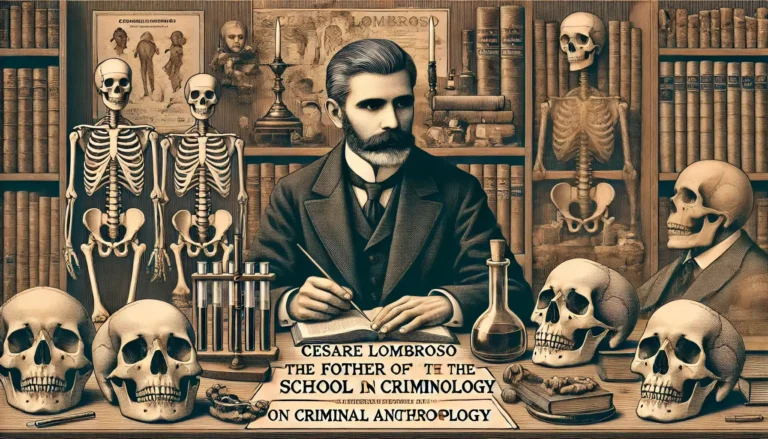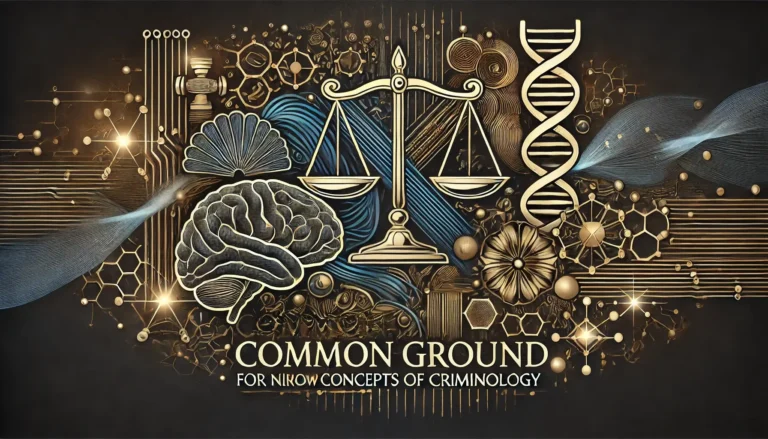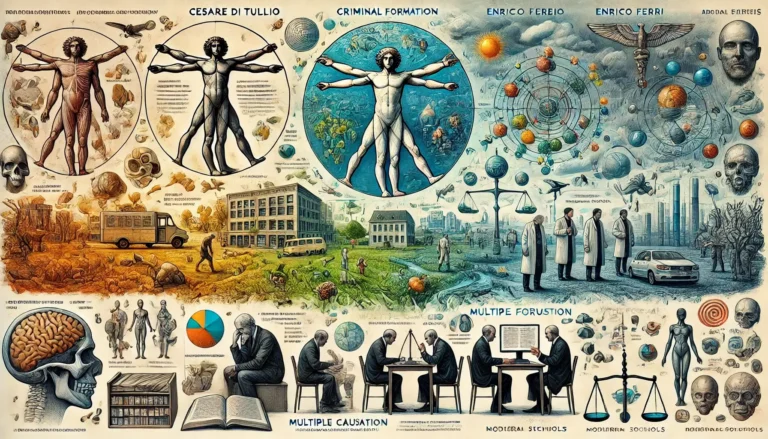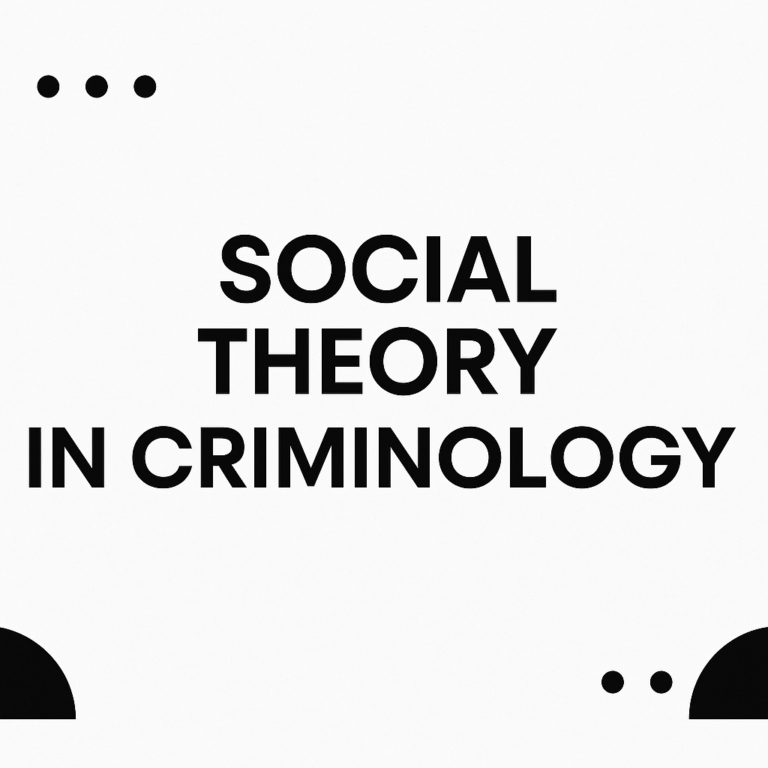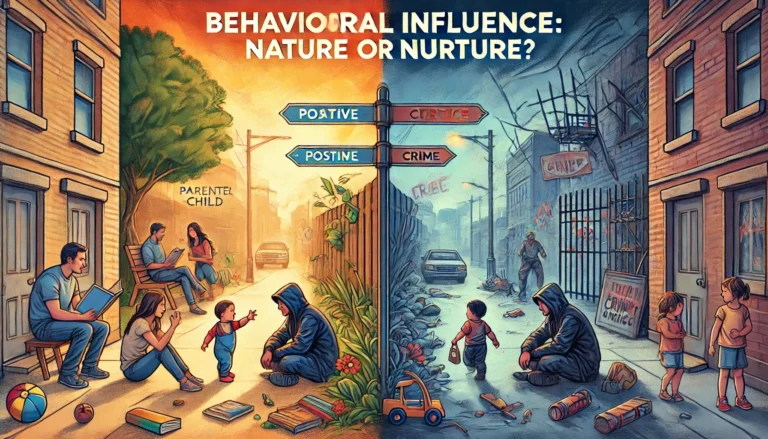Socialist School of Criminology: Theoretical Foundations and Critiques
Introduction to the Socialist School of Criminology
The Socialist School of Criminology represents a distinct perspective within the broader field of criminological theories. Rooted in the principles of Marxism, this school seeks to understand crime through the lens of class struggle, economic systems, and societal inequalities. By emphasizing the role of social and economic factors, it challenges traditional criminological approaches that focus primarily on individual behavior. The school views crime as a symptom of deeper societal issues, particularly those related to the disparities caused by capitalism. This perspective highlights the systemic nature of crime and its links to structural inequalities within society.
Historical Background
The origins of the Socialist School can be traced back to the late 19th and early 20th centuries, a period marked by significant social upheaval and economic disparity. Influenced by the works of Karl Marx and Friedrich Engels, early socialist theorists began to critique the role of economic systems in shaping societal behavior. They argued that capitalist societies inherently foster conditions that lead to crime, as wealth concentration and exploitation create environments of deprivation and alienation. This historical context provides a foundation for understanding the development of the school’s key principles.
Key Principles of the Socialist Approach
The Socialist School is built on several foundational principles:
- Crime as a Product of Social Inequality: This school posits that crime arises from the disparities inherent in capitalist societies. Economic inequality creates conditions that drive individuals toward criminal behavior. Poverty, lack of access to resources, and systemic marginalization are seen as primary contributors to deviance.
- Focus on Class Struggle: The conflict between the bourgeoisie (owners of production) and the proletariat (working class) is central to understanding the root causes of crime. According to this perspective, laws and policies often serve the interests of the ruling class, criminalizing behaviors that threaten their dominance while ignoring crimes committed by those in power.
- Critique of Capitalism: Capitalist systems are viewed as inherently criminogenic, meaning they generate conditions that foster criminal activity. The school argues that the pursuit of profit at the expense of social welfare creates environments where crime becomes a survival mechanism for the disenfranchised.
- Structural Analysis: Unlike individualistic approaches, this school emphasizes the role of social structures in shaping criminal behavior. Institutions such as the legal system, education, and the labor market are analyzed to reveal how they perpetuate inequality and contribute to crime.
Intersection with Other Social Theories
The Socialist School’s principles align with other critical social theories, such as conflict theory and feminist criminology. These perspectives share a common emphasis on power dynamics and systemic inequality, offering a broader framework for understanding the complex interplay between society and crime.
Class Struggle and Crime: The Core of Socialist Criminology
At its core, the Socialist School of Criminology argues that crime cannot be fully understood without examining the socioeconomic context in which it occurs. Key ideas include:
- Economic Exploitation: The unequal distribution of resources leads to desperation and, ultimately, criminal acts. Individuals in impoverished communities may resort to theft, drug trade, or other illegal activities as a means of survival.
- Power Dynamics: Laws are often created to protect the interests of the ruling class, criminalizing behaviors that threaten their power. For example, labor strikes or protests against exploitation may be labeled as illegal acts.
- Alienation: Workers in capitalist societies experience alienation, which can manifest in deviant behavior. This alienation stems from a lack of control over their labor, diminished social connections, and feelings of disenfranchisement.
- The Role of Ideology: The ruling class uses ideology to maintain control, portraying crime as a result of individual moral failings rather than systemic issues. This diverts attention from the root causes of criminal behavior.
Case Studies
To illustrate these concepts, scholars have examined historical and contemporary examples, such as:
- Industrial Strikes: Instances where workers’ attempts to demand fair wages were met with legal crackdowns.
- Urban Crime Rates: Studies linking high crime rates in urban areas to systemic poverty and lack of social support.
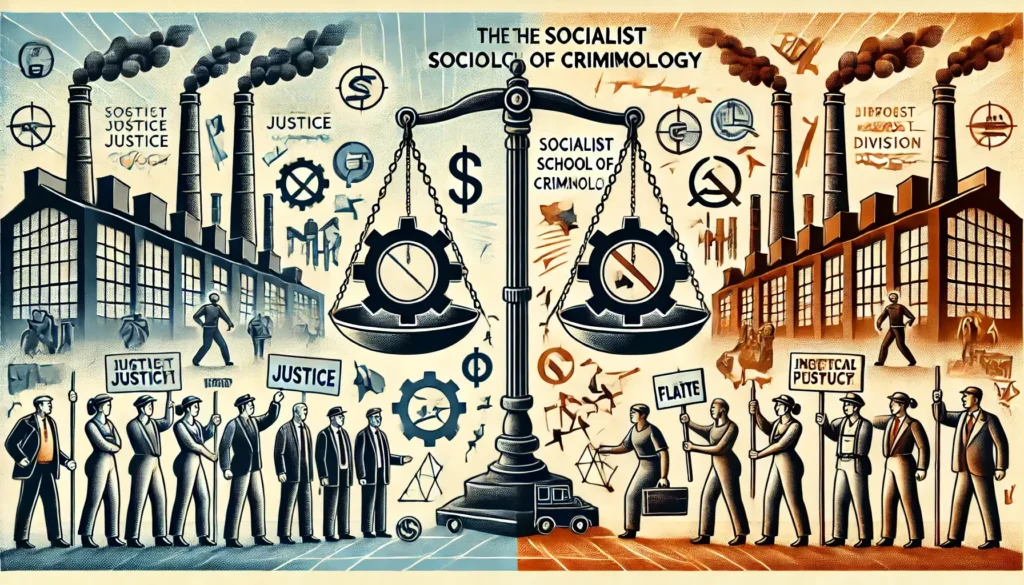
Contributions of the Socialist School to Modern Criminology
The Socialist School has made significant contributions, including:
- Broadening the Scope of Criminology: It introduced the study of systemic issues, such as poverty and unemployment, as factors contributing to crime. By shifting the focus from individuals to societal structures, it has expanded the field’s analytical framework.
- Influence on Critical Criminology: Many modern critical criminology theories, including feminist and postmodern approaches, draw on the principles of the Socialist School. These theories build on its emphasis on power dynamics and systemic inequality.
- Policy Implications: It advocates for reforms aimed at reducing inequality and addressing the root causes of crime. Examples include policies promoting universal education, healthcare, and social welfare programs.
Impacts on Global Criminology
The principles of the Socialist School have influenced criminological thought worldwide. In developing countries, its emphasis on economic and social factors has been instrumental in understanding crime patterns linked to colonialism, globalization, and resource exploitation.
Critiques and Limitations of the Socialist School
Despite its contributions, the Socialist School has faced several critiques:
- Overemphasis on Class: Critics argue that it overlooks other factors, such as psychological and cultural influences on crime. By focusing primarily on economic inequality, it may neglect the complexity of human behavior.
- Deterministic Approach: Its focus on structural factors may neglect individual agency and choice. Critics contend that not all individuals in disadvantaged circumstances resort to crime, highlighting the role of personal responsibility.
- Limited Applicability: Some scholars question its relevance in non-capitalist or mixed economies. For instance, crime persists in socialist or communist societies, suggesting that other factors are at play.
- Simplistic View of Laws: The notion that all laws serve the ruling class is seen as overly simplistic. While power dynamics undoubtedly influence legislation, laws can also reflect broader societal values and protections.
- Resistance to Empirical Testing: Some aspects of the Socialist School’s theories are challenging to empirically test, leading to debates about their scientific validity.
Responses to Critiques
Proponents of the Socialist School acknowledge these critiques but argue that its principles remain valuable for understanding systemic issues. They emphasize the importance of integrating its insights with other criminological theories to create a more comprehensive framework.
The Relevance of Socialist Criminology Today
In contemporary society, the principles of the Socialist School remain relevant, particularly in analyzing:
- Economic Inequality: The growing gap between rich and poor continues to drive crime in many regions. Research linking income disparity to higher crime rates supports the school’s arguments.
- Corporate Crime: The school’s focus on power dynamics is particularly useful in studying white-collar and corporate crimes. These crimes often involve significant harm but receive less attention due to the influence of powerful individuals.
- Globalization: The impacts of global capitalism on crime rates and patterns align with the school’s principles. For example, labor exploitation and human trafficking are often linked to global economic practices.
Future Directions
Scholars suggest that the Socialist School’s framework can be expanded to address contemporary issues, such as climate justice, technological crime, and the criminalization of migration. These areas highlight the ongoing relevance of its emphasis on systemic inequality and power dynamics.
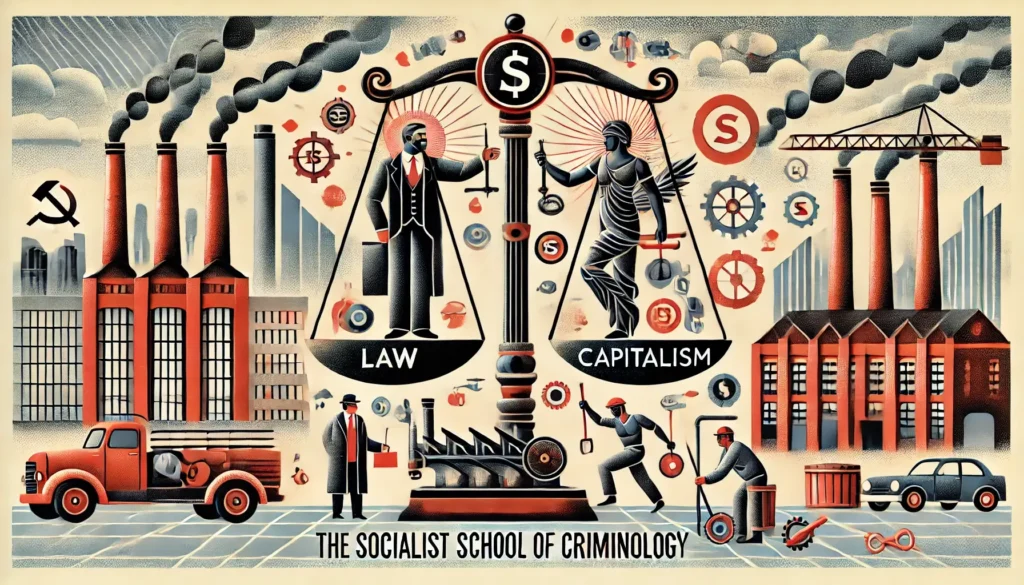
Comparing Socialist Criminology with Other Schools
The Socialist School contrasts with other criminological theories, such as:
- Classical School: Focuses on individual choice and free will. Unlike the Socialist School, it views crime as a rational decision rather than a product of structural inequality.
- Positivist School: Emphasizes biological and psychological factors. While the Positivist School examines individual traits, the Socialist School highlights societal influences.
- Critical Theories: While similar in some respects, critical theories often incorporate broader perspectives beyond class struggle, such as gender, race, and culture.
Conclusion
The Socialist School of Criminology offers a powerful framework for understanding the complex interplay between crime, class, and society. By emphasizing the systemic nature of crime and its links to social and economic structures, it challenges traditional criminological approaches. While it has its limitations, its focus on social justice and systemic reform continues to influence modern criminological thought. As societies grapple with rising inequality and new forms of crime, the principles of the Socialist School remain essential for developing equitable and effective solutions.
References
- Marx, K., & Engels, F. (1848). The Communist Manifesto.
- Bonger, W. A. (1916). Criminality and Economic Conditions.
- Quinney, R. (1974). Critique of Legal Order: Crime Control in Capitalist Society.
- Taylor, I., Walton, P., & Young, J. (1973). The New Criminology: For a Social Theory of Deviance.

